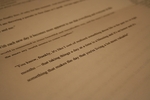I don't care what it says, who else has seen this?
One of my very first 'mentors' in the corporate world was the CFO of a rather large division of what then was AT&T. Whatever is left of that group today would likely be part of Alcatel-Lucent, although it is really impossible to say what became of the department.
Back in the day before ubiquitous e-mail, important information was circulated via the old-school written memo. The memo was usually typed out by an administrative assistant, copied, and finally distributed to two 'lists' of people. The 'To' list and the 'CC' list. Generally speaking, the folks on these lists would be the only people to see and read the contents of the memo. Flickr - mil.
Flickr - mil.
Back to my CFO. Whenever a memo of any kind crossed his desk, he immediately glanced at the top of the first page, (where the 'To' list of names was), and then quickly paged to the end of the memo, (where the 'CC' list of names was).
Once I observed him doing this and asked why he instantly paged to the end of a particular 5 page memo and he replied,
'I need to know who else has this information, before I read it, and before I even think about making a decision about it'.
He really meant it too. His approach, strategy, and decision making process was heavily influenced by his perception of 'Who else knows this?'. Back then, information could be controlled, e-mail was not universal, there was no wiki, blog, or Twitter to spread and share information. To use the old cliche, knowledge was power, and in many cases it was hoarded and exploited for the wrong reasons.
That all seems like such a long time ago, and I would like to think in the modern organization, supported by almost limitless media and technology to share and transmit information, that the 'Who else has seen this?' question is ridiculous and unimportant.
But I am not so sure.
I still think that the 1970's mindset of the closely guarded memo still endures in many organizations. I still sense that information, and access to those who have information is not as free and effortless as many of us would like to believe.
I hope that my organization, and yours, can get to the place where the answer to 'Who else has seen this?' is typically, 'Everyone'.
I hope that soon, even asking the question is ridiculous.

 Steve
Steve
Reader Comments (2)
Especially when it comes to email, I think you have to assume that 'everyone' is going to see it. While in the office, you should write and respond to emails as if they were going to be seen by everyone in the organization. If anything else, it will make you think twice before hitting that 'send' button.
Thanks Marie for the comments. It is great advice for sure. My main point is that in many organizations 95% of information is tucked away in e-mail 'channels' or silos. Some of this information may get exposed more widely and some might not. But if I am not part of the 'channel' I have no visibility or access to the information contained there. Certainly, some organizational communication is necessarily 'private', but I will bet of all the e-mails one sends and receives in one day only a tiny fraction contain 'private' information. Thanks very much for reading ans sharing your thoughts.